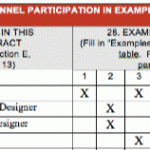
I often say that there are so many unknowns in the proposal selection process that it is impossible to accurately predict whether or not you are going to win. In fact, it is probably best to stay away from speculation completely other than “do we have a reasonable shot?”
Let me illustrate why speculation is a fool’s game.
You Might Not Know The Client’s Misconceptions
We held a $1M contract with a state agency that was essentially a four-year contract. Four months after we signed this contract an RFP hit the street that was exactly like our contract’s RFP except for two additional lines of scope. These two lines were, of course, right up our alley. As soon as we saw this, we went into panic mode. Why is this happening? Have we done a bad job?
We talked to our teaming partner which was a large engineering firm. They told us that they had heard that the original contract was meant to be earmarked for a specific firm (not us), but that firm went one page over the page limit and was completely disqualified. Therefore, this new contract was a way to give this favored firm the contract.
When we asked our teaming partner whether they would propose with us on this new contract, they simply said “no.” Why would they say “no?” They explained that it was in their best interest for another firm to have this contract as well.
We finally got a hold of our client. He indicated that the reason for the client advertising another RFP with virtually the same scope of work as is in our contract, was that his boss had talked to someone (he thought from our firm) who was teaming with XYZ Construction Company on an upcoming project.
In my firm’s line of business, that would be considered, by many, a direct “conflict of interest.”
Therefore, to eliminate the possible conflict of interest, the client quickly advertised another RFP. Just to satisfy our own curiosity, we contacted the XYZ Construction Company. It turns out that they were teaming with a firm that had a similar name, but was clearly not us.
You May Be Relying on Unreliable Intel
Teaming partners can be a great source of client intelligence. But be careful not to take intel received by a third party as gospel.
Many people, including me, have been burned by intel, from teaming partners, that ended up being inaccurate.
I remember one specific instance where two different sources told me that a particular client was “fed up” and “had a lot of problems” with the incumbent. Based on this intel, I decided to “go” a proposal effort I normally wouldn’t have.
In the end, we lost to the incumbent. Upon post-debrief analysis, I realized it was mathematically impossible for us to beat the incumbent because the intel was wrong.
Is It Really Wired?
During my go/no go evaluation of an RFP, I decided to contact a mentor of mine who was working for a direct competitor.
She knew about the RFP. She then let me in on a secret. This contract was “wired” for her firm. In fact, her engineers had written the RFP.
I decided that the pursuit wasn’t the right fit for us. We were missing a key ingredient. And this new intel helped solidify my decision.
Did my mentor’s firm win the contract? No.
And years later, we went on to not only beat her firm but also beat the incumbent.
The bottom line is, even if you’ve written the RFP, there is no guarantee that anything is wired for you.
Your Next Action
These are just three stories that illustrate why I don’t believe in speculating about a procurement.
In my mind, it’s impossible to speculate beyond, “Do we have a reasonable shot at winning?”
Avoid speculating when it comes to proposals. And only rely on information you are absolutely sure of.
Now It’s Your Turn
Have you ever speculated about a proposal only to have it bite you later? Are you in favor of speculating?Share your stories and opinions in the comments.





ASSUME is a bad word when it comes to Sales. The more a sales person assumes the more the distance he creates with the deal. 3rd party intel is crucial but assessing with our own intelligence and gut feeling is very important than taking that as an excuse. There has been several contracts where we say the deal is earmarked to X company and we don’t be aggressive at it, whereas the deal goes to Y and we just make up excuses. My point is unless the Key Player chart is established for each opportunity – the deal is not yours. Sales people need to have the discipline of getting this right and put efforts to close the gaps.
Thanks for sharing!